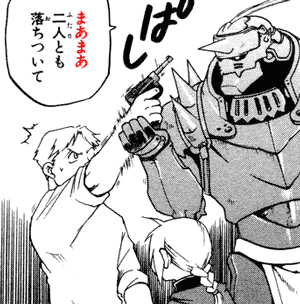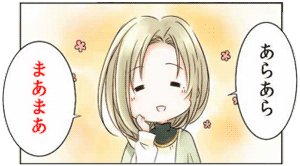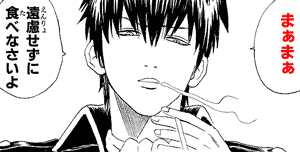In Japanese, maa maa まあまあ means various things. It can mean something is neither good nor bad, it can be used to tell someone to calm down, and it can also be, literally, the word maa まあ twice.
It's also spelled maa maa まぁまぁ or maa maa まーまー.
Not to be confused with mama まま, "the way it is," or mama ママ, a word for "mother" in Japanese.
Calm Down
One way maa maa まぁまぁ is used is to deescalate the situation. When people start arguing, and getting angry, and start fighting, and so on, maa maa can be used to recommend that they calm down.
- maa maa sou iu na
まあまあそう言うな
Now, now, don't say [stuff] like that.- You're too mad, man. Calm down.
- na
な
Don't. (negative imperative, used after verbs.)
Note that this is a function that just one maa まぁ alone also has, but with more intense arguments you need more intense maa's.
- Context:
little brother saves gunman from imminent deatharmor dude stops a fight. - maa maa
まあまあ
(interjection before recommending something.) - futari tomo
二人とも
[You] two. - ochi-tsuite
落ちついて
Calm down. (recommendation.)
"Neither Good nor Bad"
The word maa maa まぁまぁ can be used to say something is or was "neither good nor bad," that it is "so-so." That it's honestly pretty mediocre, but passable nonetheless.
- dou deshita ka?
maa-maa deshita
どうでしたか?
まあまあでした
How was it?
It was so-so. (it was neither good nor bad.) - maa-maa tte toko da ne
まあまあってとこだね
It's just barely enough, don't you agree?- It's passable, but almost isn't.
- tte
って
Contraction of to-iu という, makes maa-maa, "so-so," qualify the toko.
The toko could be said to be maa-maa. (literally.) - toko とこ
tokoro ところ
Place. Spot. (nominalizer.) - It's in a "so-so spot." A "spot you could call so-so." That is, it's not in a good spot or a bad spot, it's just about enough. Note that "spot" isn't a physical, geographical place here, but refers to the state in which something is. (so-so.)
まぁ Twice
In a lot of cases, maa maa まぁまぁ is a lot more than the word maa まぁ twice. An intensified version of maa. The word maa まぁ has various uses. It can be an interjection. It can be an adverb. It can mean "well," it can mean "I guess." So make sure to check the article on maa まぁ later, too.
- ara ara maa maa
あらあらまあまあ- Literally ara twice plus maa twice.
- Doesn't really mean anything
- Just a very long interjection.
- Used by ojousama お嬢様 a lot.
- ara
あら
"Oh?" (interjection.)
Used when surprised at something. - maa
まあ
"Well." (also interjection.)
Used when taking a good look at something unexpected. - So it is, as you can see, an interjection used when taking a good look (because it's entertaining, comforting, wonderful, etc.) at some unexpected thing that just happened (like something that someone just did or said).
- Context: Hijikata invites someone to a restaurant, to talk about something.
- maa maa
まぁまぁ
For starters.- Used when offering someone something before talking, etc.
- enryo sezu ni tabenasai yo
遠慮せずに食べなさいよ
Eat without reservation. (imperative.)- i.e. don't mind me, just go ahead and eat.
References
- まあまあの意味 - デジタル大辞泉 via dictionary.goo.ne.jp, accessed 2019-03-04.



No comments: